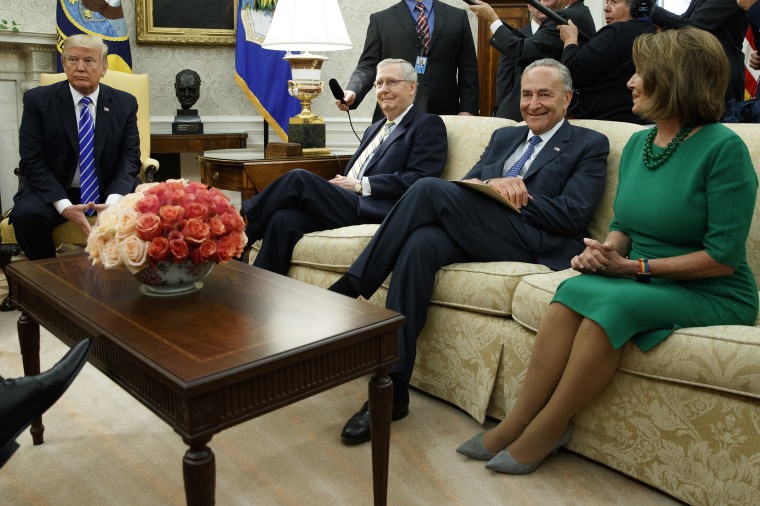WASHINGTON — With tax overhaul efforts dominating the congressional agenda, some Republicans on Capitol Hill are increasingly worried that they are in danger of coming up short on a rapidly approaching deadline to continue funding the government and prevent a shutdown.
Current funding for the government runs out on Dec. 8, setting up a critical deadline for Congress at a time when leadership in both the House and Senate are concentrating most of their attention on trying to pass a tax bill.
"If folks can't get at least a tentative spending deal by Thanksgiving, we're headed for a CR or shutdown fight in December," a source familiar with the timing of negotiations said, using the abbreviation for continuing resolution, a short-term spending bill that defense hawks oppose because it doesn't take into consideration new military needs.
Congress leaves town on Thursday or Friday until after Thanksgiving, leaving little time to work out a deal on government spending levels for defense and nondefense programs. House Speaker Paul Ryan, Senate Majority Leader Mitch McConnell, Senate Democratic Leader Chuck Schumer and House Democratic Leader Nancy Pelosi lead negotiations alongside the White House.
A September agreement between President Donald Trump and Democrats to push all of the government funding deadlines to December was touted by the White House and some Republicans as a move to clear the legislative deck to make room for the tax overhaul. Now, taxes are crowding out significant movement on the must-pass legislation, Republican and Democratic aides say.
“Omnibus negotiations are slow but not seeing any progress to my knowledge,” one Republican House aide who is not a part of the negotiations but who receives updates said of the funding measure. The aide took that as a “sign we will get jammed with a bad deal at the last minute.”
The closing window for a deal is also bringing other issues into the mix, most notably the question of how to address the status of undocumented immigrants who came to the country as children, known as Dreamers, under the DACA program, and Trump's demand for border security or a border wall.
"No one wins in this situation. Democrats will lose on DACA before the fight begins. Same for Republicans on authorized defense or the wall," the source familiar with timing said.
Republicans would like any legislation addressing their legal status to be a stand-alone law, but a growing number of Democrats are threatening to force a government shutdown if DACA is not addressed in the spending bill.
House Republicans have been singularly focused on the tax legislation, an effort that will continue this week as it comes up for a vote before the full House. With only 10 legislative days left before the Dec. 8 funding deadline, little time is left for negotiations on that front. And before a government spending bill can be worked out, the first step is agreeing on spending levels.
“They can’t” focus on it, one senior Democratic aide said of House Republicans. “That’s why they want to pass tax reform before Thanksgiving.”
Both Republicans and Democrats want to lift the 2011-era spending limits on defense and nondefense government spending, but those spending levels have not yet been hammered out. Republicans want an increase in the defense budget while Democrats want an equal increase in the nondefense budget.
In addition, Congress expects another emergency spending bill to come down from the White House for hurricanes and other natural disasters, further complicating the spending bills.
Democrats expect a two-week extension to give negotiators more time, which would put a new deadline of Dec. 22, days before Christmas.

